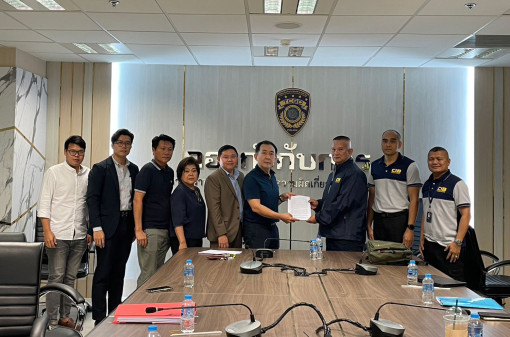PTT service station operators file police complaint over claims about customers being short-changed

Oil retailers under the PTT brand have filed a complaint with police against people who shared messages and a video online that accused them of selling fuel unfairly.
The case follows a controversy at a PTT station in Kaeng Khoi district of Saraburi, in which it was claimed that the law allows a seller to dispense oil at a slightly lower amount than what the buyer paid for.
The issue erupted last month after a customer posted a video that went viral online. It showed the fuel sold at the station fell short of the five litres the customer had purchased. He used a meter to measure the level and found the irregularity.
The station and the Department of Internal Trade at the Ministry of Commerce subsequently explained it was a “permissible error”, as the law allows the amount of fuel sold to be plus or minus 50 millilitres, or 1%, for every 5 litres.
The buyer was not satisfied with what he considered an unfair transaction.
It remains unknown whether the petrol station in question was run by PTT Oil and Retail Business Plc (OR) or an independent entrepreneur under the PTT brand.
OR has already clarified that a permissible error can occur in sales of liquid goods and it is internationally acceptable, said lawyer Monchai Jongkrairattnakul, who led a group of oil retailers to lodge the complaint with the police Central Investigation Bureau on Friday.
“Those online messages not only branded the oil sale as an unfair trade but also defamed OR and caused hatred towards the company,” he said, adding the messages and the video are still being shared on the internet.
Mr Monchai said fuel dispensers at PTT petrol stations are checked frequently by the authorities, so it is impossible for retailers to take advantage of customers.
OR president Suchart Ramarch said the fuel dispenser issue provided a “valuable lesson” to the company on ways to approach the problem.
He said a permissible error can occur during oil transport and sales, so management and an appropriate response to the problem are crucial to ensure fairness for both retailers and consumers.
Some petrol stations under the PTT brand reported that their sales dropped during the New Year holidays. They believed it resulted from the video.
A source at the Department of Energy Business, who requested anonymity, said tests must be carried out for different amounts of fuel sold, ranging from 20 to 50 litres, to see whether such permissible errors still occur or whether there are any other irregularities with the dispensers.
“We should not completely put the blame on the oil seller because of just one error in this case. That would not be fair to the petrol station,” he said.
However, an executive of an oil company who asked not to be named, said the possibility that a dispenser at the station in question was substandard should not be dismissed.
During inspections of 14,000 petrol stations conducted by the Department of Internal Trade between August and mid-December last year, officials found 281 dispensers at 34 stations failed to meet the legal standard, according to media reports.
At 19 stations, it was found that fuel was dispensed in amounts that exceeded or were below the permissible 1% error level.
Another local oil retailer, who also requested anonymity and declined to disclose his brand, said his stations had not faced problems resulting from selling fuel below the purchased amount.
“But this does not mean we will simply use this issue to win over our competitors,” he said.
The Ministry of Energy, meanwhile, has responded to the high public interest in the issue to say that it will amend a law to ensure consumers receive the exact amount of fuel that they pay for.

